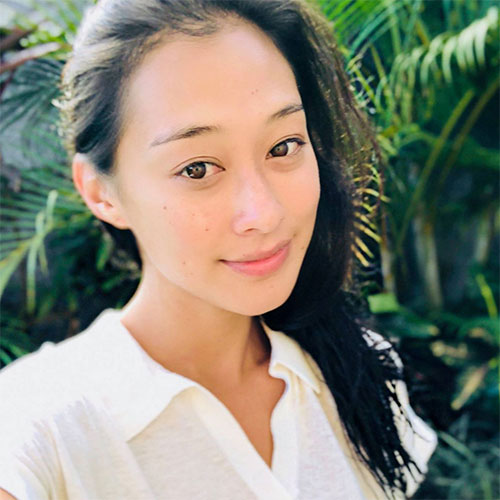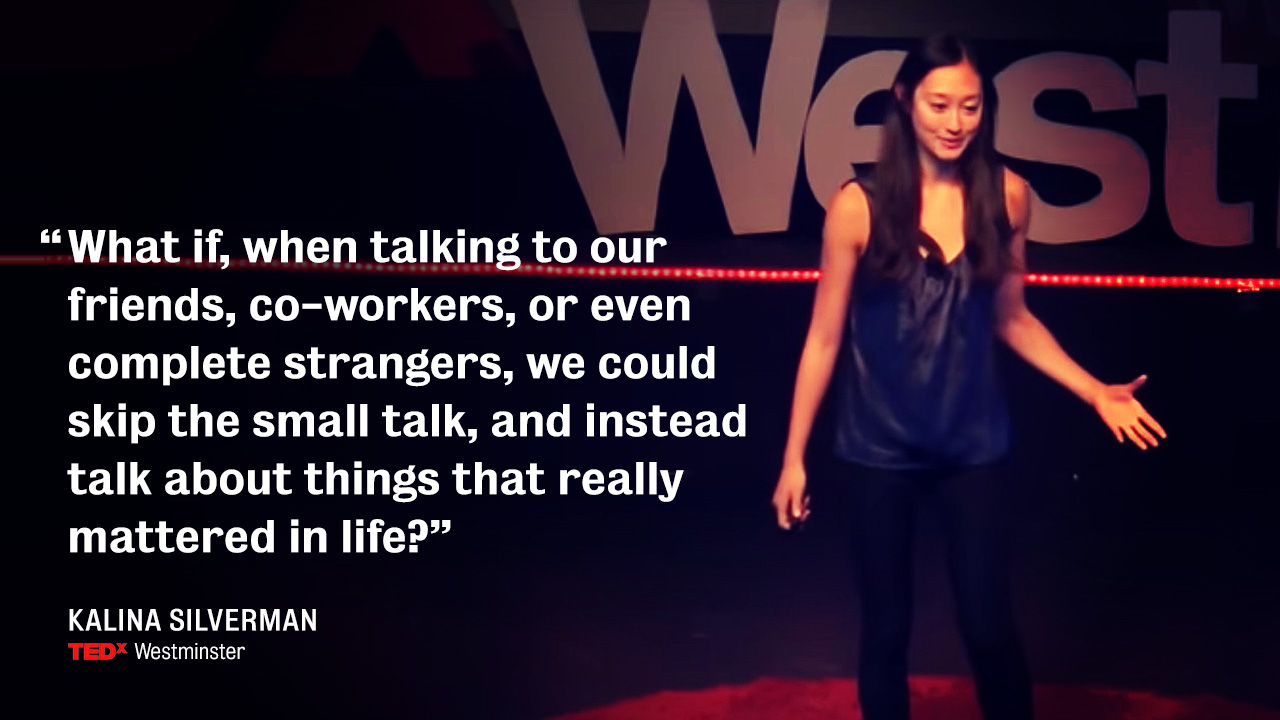What is Big Talk?
Skip the small talk, make more meaningful connections.
Big Talk is a communication approach for skipping the small talk to make real, meaningful connections with those around you – whether it’s loved ones, colleagues, classmates, teammates, community members, or even total strangers. By prompting deep, open-ended questions, Big Talk conversations allow people to share life stories, lessons, and experiences, enriching relationships in a profound way.
Why make Big Talk?
Big Talk offers a remedy for the loneliness epidemic by promoting genuine interactions, empathy, community building, and storytelling. While technology connects us globally, it often hinders our ability to engage meaningfully in face-to-face conversations. Learning to make Big Talk not only combats feelings of isolation but also boosts communication skills, strengthens relationships, and fosters a greater sense of belonging within our communities at work, home, and school – and in the broader world.
Big Talk’s Purpose
Big Talk is a global movement dedicated to combating loneliness, nurturing community, and fostering curiosity and empathy worldwide. From engaging video series and thought-provoking question games to educational programs and cultural events, Big Talk encourages people to share their stories and connect on a deeper level. By embracing our differences and celebrating our shared experiences, Big Talk aims to bring people closer together and create a more connected world through authentic conversations.
History
Eight years ago, Kalina Silverman started Big Talk as an experimental video project to overcome feelings of loneliness. Although she met new people each day, she felt there was a sense of disconnection, fueled by the superficiality of everyday interactions.
So, one day, she tried skipping the small talk to “make Big Talk” instead, and immediately noticed she was making more meaningful connections with her peers. Encouraged by this reaction, she made a video to demonstrate Big Talk, where she approached strangers and asked them the question: “What do you want to do before you die?”
Kalina was surprised when people not only answered the question but also shared their most personal and moving life stories. This openness gave Kalina the type of bond she felt was missing in small talk, and her interactions with strangers turned into friendships she still maintains today. To share her Big Talk experiences, she edited the footage and posted the video to YouTube. Within a couple of weeks, the video went viral and the Huffington Post, USA Today, Business Insider, and Right this Minute wrote feature stories about Big Talk.
As stories and feedback began pouring in from people around the world who also felt disconnected, Kalina was inspired to grow Big Talk into more than a personal project, but rather into a global social impact initiative that could help people communicate more openly and connect meaningfully around the world.
Kalina was invited to give a TEDx talk, “How to skip the small talk and connect with anyone.” It now has 6.5 million views, and Big Talk has appeared in Forbes, NBC News, the LA Times, Washington Post, the Today Show Online, The Big Ten Network, and more. Through organic widespread reach, Big Talk has grown into a global movement.
Over the years since, Kalina has received outreach from people all over the world who have been inspired to join the Big Talk movement and they have shared their experiences – from how Big Talk inspired them to reconnect with estranged family members and find love in romantic relationships, to opening up at work, to dealing with depressive and suicidal thoughts.
Now, Kalina travels around the world making videos, delivering lectures, and leading workshops about how people can “make Big Talk,” – at work, with friends and family, with strangers, and even by themselves – to make their everyday lives more purposeful and meaningful. She has spoken for communities (the City of Santa Monica, the California Marital and Family Therapists Association, Veterans Rites, Institute of International Education), corporations (Microsoft, Google, Adobe, Acelero Learning, Elite SEM), universities (Northwestern, USC, University of Maryland Business School), and more. In 2017, Big Talk was awarded a Fulbright research grant for the study “How to use Big Talk to establish empathy across cultures.” In 2019, Kalina was selected as a Fulbright Ambassador and presented on Capitol Hill to Senator Dick Durbin and to Senator Chris Coons, who ended up using Big Talk at his staff retreat.
A cross-cultural communications ambassador, Kalina has delivered Big Talk events at WeWork in Australia, at a business school in Kazakhstan, and for the U.S. State Department in Uzbekistan – She also delivered a Big Talk keynote for 1000 teenage girls for a UN International Day of the Girl Celebration, and spoke at the Foundation for Connection Action Forum alongside the U.S. Surgeon General.
Today, Big Talk is an enterprise that includes videos, an app, a card game (Big Talk card game on Amazon), educational programs, as well as events worldwide, from the U.S. to Australia, South Africa, Kazakhstan, China, Trinidad and Tobago. Adopters of Big Talk have included the Los Angeles Lakers, superstar celebrities such as Billie Eilish, Lorde, and Keith Urban in a series launched by Universal Music Australia, a U.S. Senator and the U.S. State Department, Harvard Medical School, Northwestern Business School, University of Southern California, New York University Shanghai, numerous mental health professionals, military veterans, employees across Amazon, Microsoft and Google, and even a prison education startup. Big Talk has also inspired a marriage proposal!
Meet the Founder
Kalina Silverman
Creator of Big Talk

Kalina created Big Talk. She travels globally to make videos, give lectures, and help teach people how to “make Big Talk” in different environments and cultures. Kalina received her degree in Broadcast Journalism from Northwestern University and spent a year working as a Fulbright Research Scholar in Singapore studying ways to use Big Talk to establish empathy across cultures. She is now a U.S. Fulbright Ambassador.
Skip the small talk: What do you want to do before you die?
“Before I die, I want to build an eco resort that employs people in need, whether refugees fleeing conflict zones or army veterans – and provides fun cultural educational opportunities for visitors. I also hope to raise a family, paint a mural, and compose music.”

